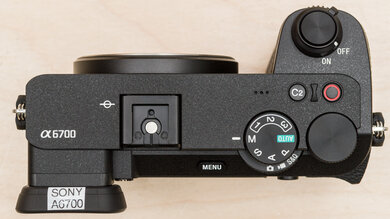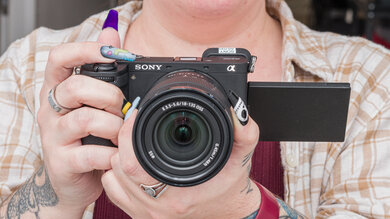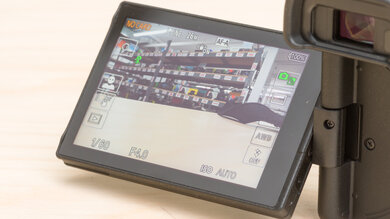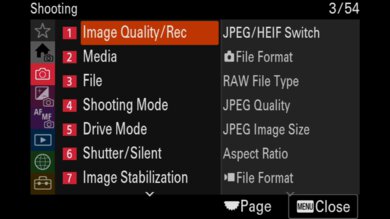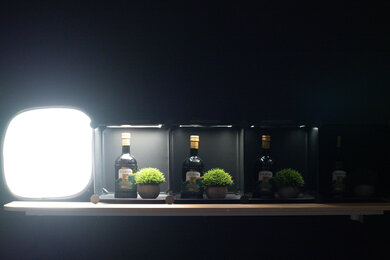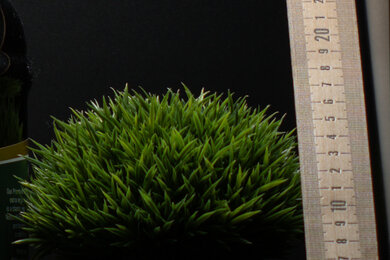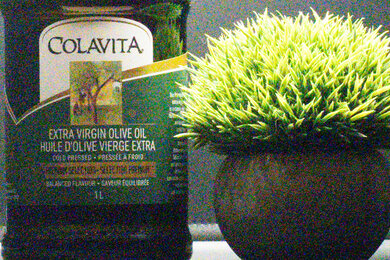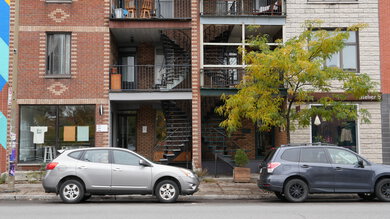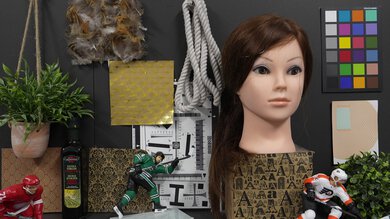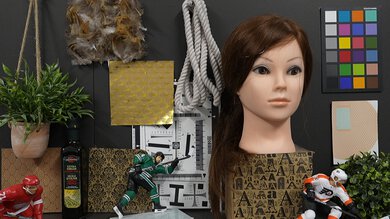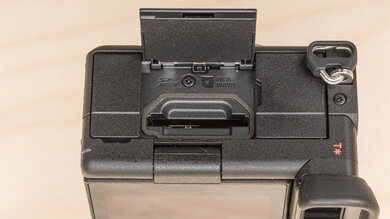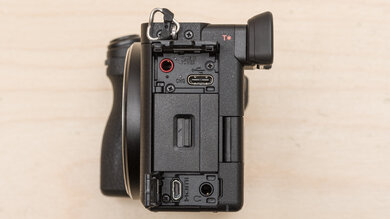The Sony ZV-E10 is an entry-level vlogging camera. With similar internals to the Sony α6100 and the dedicated vlogging features of the Sony ZV-1—including a fully-articulated screen, vlogging mic, and no viewfinder—it's made for YouTubers and content creators who want to record vlogs without breaking the bank. It's a good middle ground between the compact ZV-1 and the full-frame Sony ZV-E1, with a more portable design than the latter and more flexibility with lenses than the former.
Our Verdict
The Sony ZV-E10 is great for travel photography. The body is very portable and lightweight, and the camera feels pretty sturdy. It also has a great battery life for longer days on the go, depending on how frequently you shoot and what settings you use. Its autofocus system is excellent at tracking moving subjects and provides several options for you to fine-tune its performance. Image quality is great, especially if you just want to shoot JPEGs. That said, the camera doesn't have a viewfinder, which is a bit limiting, and the camera can feel a bit cramped if you have larger hands.
-
Great battery life.
-
Excellent overall autofocus.
-
Highly portable.
-
No viewfinder.
The Sony ZV-E10 is very good for landscape photography. Its APS-C sensor has a solid amount of dynamic range to bring out shadow and highlight detail in high-contrast scenes. That said, you won't get as much usable dynamic range as full-frame alternatives. Still, you get a fair amount of leeway to manipulate exposure without introducing too much noise. There's also an automatic HDR mode and a bracketing mode that allow you to expand the camera's dynamic range or take a series of photos at different exposures to manually combine them later. On the other hand, the camera isn't the most comfortable to shoot with, and it lacks a viewfinder to help with framing and composition. It also isn't weather-sealed, which isn't a dealbreaker but would give you a bit more peace of mind when shooting in adverse weather conditions.
-
Great battery life.
-
Solid dynamic range.
-
No viewfinder.
The Sony ZV-E10 is decent for sports and wildlife. It has a fairly quick max burst rate of 11 fps, which is well-suited to capturing moving wildlife or sports. That said, it takes a very long time for its photo buffer to empty once full, which can slow you down at a potentially critical moment if you manage to fill it up. Its autofocus system is excellent overall; however, it sometimes fails to pick up on the intended target. Thankfully, you can fine-tune the AF sensitivity to suit your needs. Unfortunately, it doesn't have a viewfinder for more precise framing.
-
Great battery life.
-
Excellent overall autofocus.
-
Quick max burst rate.
-
No viewfinder.
-
Autofocus isn't as reliable as other Sony cameras.
-
Takes a long time for buffer to empty once full.
The Sony ZV-E10 has great RAW image quality. Photos have plenty of fine detail, and the camera does a good job of managing noise levels in low light. Dynamic range is great, too, so it can capture a fairly wide range of detail in high-contrast scenes.
-
Good low light performance.
-
Great dynamic range.
The Sony ZV-E10 is excellent for vlogging, which is no surprise since this is its main intended use. The camera has a fully articulated screen that lets you monitor yourself while filming. If you don't have a tripod or shooting grip, the camera's handgrip has a relatively flat design that makes it easier to hold in a selfie position. The camera also has an excellent autofocus system that tracks faces well in video, and video quality is good overall, although it struggles a bit with noise in low light. Unfortunately, there's a very noticeable rolling shutter effect in 4k, which can distort straight lines in the background when vlogging on the move.
-
Fully articulated screen.
-
Great battery life.
-
Excellent overall autofocus.
-
No recording time limit.
-
No IBIS.
-
Autofocus isn't as reliable as other Sony cameras.
-
Very noticeable rolling shutter effect.
The Sony ZV-E10 is good for studio video. Video quality is good in more controlled lighting conditions, though it struggles a bit in low light. The camera offers several picture profiles and Log recording profiles, meaning you can manipulate the look of your footage to your preference. However, it's limited to 8-bit 4:2:0 color internally, so you have less flexibility with Log footage. Thankfully, the camera doesn't have a recording time limit and doesn't overheat throughout its battery runtime. If you need extra battery life, you can keep recording while powering the camera externally.
-
Great battery life.
-
Excellent overall autofocus.
-
Log profiles.
-
No recording time limit.
-
Limited to 8-bit 4:2:0 internal recording.
-
Very noticeable rolling shutter effect.
The Sony ZV-E10 isn't meant for action video. It isn't water-resistant and isn't designed to mount to action cam rigs. It also has very limited frame rate options for action video recording in 4k, although it can shoot 1080p at up to 120 fps. It doesn't have IBIS, and using an optically stabilized lens only gets you so far when reducing camera shake.
-
Great battery life.
-
Excellent overall autofocus.
-
No IBIS.
-
Very noticeable rolling shutter effect.
-
Not water resistant.
-
Limited high-speed frame rates.
- Travel Photography
- Landscape Photography
- Sport & Wildlife Photography
- Raw Photo Performance
- Vlogging
- Studio Video
- Action Video
- Updated Jan 29, 2024: Added text to 'Raw Photo Performance' verdict box.
- Updated Jan 29, 2024: Converted to Test Bench 0.12.1.
- Updated Oct 12, 2023: Brushed up text for clarity and added additional information comparing this camera to newer ZV-series models.
- Updated Sep 07, 2023: We've updated the 'Sensor Type' from 'Exmor CMOS' to 'CMOS' to reflect the general sensor type without Sony-specific terminology.
- Updated Jul 21, 2023: Added a link to the Sony ZV-1 II in the 'Portability' section.
- Updated Jul 13, 2023: Added a link to the Sony ZV-E1 to the 'Sensor' box.
- Updated Jun 23, 2023: Added a link to the Canon EOS R50 in the 'Viewfinder' box.
- Updated Jun 09, 2023: Added a link to the Nikon Z 30 in the '4k Video Frame Rate' box.
- Updated Apr 05, 2023: Converted to Test Bench 0.12.
- Updated Jan 23, 2023: Added text to 'Photo AF-C Tracking' and 'Photo AF-C Center Point' boxes, with minor touch-ups throughout the review for clarity.
- Updated Jan 23, 2023: Converted to Test Bench 0.11.
- Updated Sep 16, 2022: Converted to Test Bench 0.10.
- Updated Aug 05, 2022: In accordance with Test Bench 0.9, we've updated the text for 'Photo RAW Dynamic Range'.
- Updated Aug 04, 2022: Converted to Test Bench 0.9.
- Updated Jun 28, 2022: Review published.
- Updated May 27, 2022: Early access published.
- Updated May 11, 2022: Our testers have started testing this product.
- Updated May 11, 2022: The product has arrived in our lab, and our testers will start evaluating it soon.
- Updated Jan 13, 2022: We've purchased the product and are waiting for it to arrive in our lab.
Differences Between Sizes And Variants
The Sony ZV-E10 comes in two color variants: 'Black' and 'White'. You can buy it in a bundle with the Sony E 16-50mm 3.5-5.6/PZ OSS kit lens or without any lens. You can see our unit's label here.
Let us know if you come across another variant, and we'll update the review.
Compared To Other Cameras
The Sony ZV-E10 is an excellent entry-level vlogging camera. While it isn't as portable as point-and-shoot stablemates like the Sony ZV-1 or Sony ZV-1 II, its interchangeable-lens design gives you more flexibility, and the camera has a better battery life. With its articulating screen and low-profile handgrip, as well as vlogging-specific features like 'Background Defocus' and 'Product Showcase', at a very reasonable price, this is a great option for beginner and budget vloggers. However, it lacks some of the more advanced features found on the higher-end full-frame Sony ZV-E1, like 10-bit internal recording, 4k 60 fps video, and in-body image stabilization (IBIS). Heavy rolling shutter effect can also be a dealbreaker for those who shoot action video or anything with quick panning movements.
For more options, see our recommendations for the best vlogging cameras, the best 4k video cameras, and the best cameras for beginners.
The Sony α6400 and the Sony ZV-E10 are both great mirrorless cameras for beginners. The a6400 is a little better suited for photography since it has a viewfinder, and it's a little more comfortable to shoot with and better-built, with a weather-sealed magnesium alloy construction. The ZV-E10, on the other hand, is aimed specifically at vloggers and has a few advantages over the a6400 in that area, specifically a better built-in mic, an e-stabilization feature, and a fully articulated screen.
The Canon EOS R50 and the Sony ZV-E10 are both great beginner cameras. The ZV-E10 is geared more toward vlogging, with a better internal microphone and a more portable body, while the R50 is better for photography thanks to its viewfinder. The ZV-E10 has more third-party lens options available if lens selection is important to you. Otherwise, the cameras are fairly evenly-matched.
The Sony ZV-E1 and the Sony ZV-E10 are part of Sony's dedicated vlogging camera lineup. They look and feel similar in design, with fully articulated screens, no viewfinders, and vlogging microphones. However, the Sony ZV-E1 is a higher-end camera with better internal recording capabilities and a better full-frame sensor that captures higher-quality footage. The ZV-E1 can be overkill for some vloggers, and the ZV-E10 is more portable.
The Sony α6100 and the Sony ZV-E10 are similar APS-C mirrorless cameras. The ZV-E10 is more geared toward vlogging, with no viewfinder and a fully articulated screen. The ZV-E10 also has a slightly newer version of Sony's AF system, has an updated color science to improve skin tones, and includes an e-stabilization feature in video mode. Otherwise, the cameras offer very similar image and video quality and overall performance.
The Sony ZV-E10 is essentially an interchangeable-lens version of the Sony ZV-1. If portability is your biggest priority and you like the convenience of a built-in lens, the ZV-1 is a great choice for vlogging. If you're looking for a little more versatility and are willing to spend extra money on lenses, the ZV-E10 will get you better image and video quality thanks to its larger sensor. It also has a longer battery life.
The Sony ZV-E10 and the Nikon Z 30 are very evenly matched vlogging cameras. The Sony is more portable, but the Nikon has better ergonomics and a more intuitive user interface. Both cameras can record 4k video at up to 30 fps, though the Sony imposes a slight crop at 30 fps while the Nikon doesn't. The Sony also supports Log recording, has a better battery life, and is less prone to overheating. If you're sticking with the kit lens, the Nikkor Z DX 16-50mm f/3.5-6.3 VR is a bit better than the Sony E 16-50mm 3.5-5.6/PZ OSS. However, outside of the kit lenses, there are many more lens options available for Sony's E-mount than for Nikon's Z-mount.
The Sony α7 III is better than the Sony ZV-E10, but they're intended for different uses and aimed at users of different experience levels. The α7 III is much more well-rounded for photography, with a full-frame sensor, a viewfinder, in-body image stabilization, and dual SD card slots. The ZV-E10, on the other hand, is a budget vlogging camera with a more portable design and a fully articulated screen, making it the better choice for on-the-go vlogging.
The Sony α6000 and the Sony ZV-E10 are both solid budget cameras, but the ZV-E10 is better overall. It's much better for video, with 4k recording and more video features, and uses a newer sensor with better processing. Its autofocus is also more effective. However, it doesn't have a viewfinder, which may be a dealbreaker for some photographers.
The Sony ZV-E10 and the Sony ZV-1 II are both part of Sony's ZV lineup of dedicated vlogging cameras, but the ZV-E10 is an interchangeable lens camera while the ZV-1 II is a point-and-shoot with a fixed lens. Both have advantages and disadvantages. The ZV-E10 gives you more flexibility and uses a larger sensor with more dynamic range. It also has better battery life. On the other hand, the ZV-1 II is more portable, if that's a priority, and offers the convenience of a built-in lens for those who don't want the expense and complexity of switching out lenses.
The Sony α6600 is better overall than the Sony ZV-E10. It has built-in image stabilization, a sturdier, weather-sealed body with a viewfinder, and significantly better battery life. However, it isn't as portable and lacks some of the vlogging-specific features found on the ZV-E10, like 'Background Defocus' and 'Product Showcase'.
The Sony ZV-E10 is a little better than the Canon EOS M50 Mark II. Unlike the Canon camera, the Sony has an unlimited recording time limit. It also has a better battery life and supports USB charging. It's a much better option for 4k recording as well since it offers more frame rates, and it can shoot 4k / 24p video without a crop, whereas the Canon can only record 4k / 24p with a severe 1.5x crop. Finally, the Sony camera has a more reliable autofocus system.
The Sony ZV-E10 and the Fujifilm X-T30 II are aimed at different users, though they're both good beginner cameras. The Sony is intended for vloggers, and its design reflects that, with a fully articulated screen, simple button layout, and portable form factor. The Fujifilm, on the other hand, is aimed at photographers and has a viewfinder, dedicated exposure dials, and tilting screen.
The Fujifilm X-S10 and the Sony ZV-E10 are both aimed at vloggers, but the Fujifilm is slightly more well-rounded. Get the Fujifilm if you need in-body image stabilization and like to have the option to shoot through a viewfinder. However, if battery life and portability are priorities, the Sony is still a great option.
The Sony ZV-E10 is better overall than the Panasonic LUMIX G100. They're both vlogging cameras, but the Sony model has a few advantages, including a better AF system, an unlimited recording time limit, and better video stabilization.
The Sony ZV-E10 is better than the Sony RX0 II, though they're different cameras intended for different uses. While it isn't as rugged or compact as the RX0 II, the ZV-E10 is more versatile thanks to its interchangeable lens design. Its larger sensor also delivers better image and video quality, and it has a more effective autofocus system.
Test Results
While it isn't as portable as fixed-lens ZV-series cameras like the Sony ZV-1 and Sony ZV-1 II, the ZV-E10 has a relatively compact body. It's very lightweight, especially when paired with a smaller lens like the Sony 16-50mm f/3.5-5.6 kit lens, meaning it won't cause much fatigue during longer shooting sessions, and you can easily fit it into a small camera bag.
The camera feels well-built. It's made of plastic and feels similar in build quality to the Sony α6100, though it's a step down from the magnesium alloy body of the Sony α6400. The battery compartment and inputs, aside from the microphone jack, are covered by sturdy-feeling doors. The buttons are also pretty clicky and offer good physical feedback. Another nice touch is the fixed shoulder strap attachment points, which won't rattle around and cause noise when recording vlogs or videos. That said, there's no weather-sealing like you get with the high-end Sony ZV-E1.
The Sony ZV-E10 has two command dials: a top dial near the back thumb rest and the control wheel on the back, which also acts as a directional pad to navigate the menu.
- Sony ZV-E10 camera body
- Sony E 16-50mm 3.5-5.6/PZ OSS lens
- Sensor cap
- Front and rear lens caps
- Shoulder strap
- Wind screen for microphone
- 1x Sony NP-FW50 battery
- USB-A to USB-C cable
- AC adapter
- Startup guide and documentation
The camera feels fairly comfortable to shoot with. It doesn't have the biggest or most comfortable handgrip, but the grippy texture feels secure. The handgrip is notably smaller than Alphas like the Sony α6100 and the Sony α6600, but it's more suitable for a front-facing selfie grip, which makes sense given its vlogging-oriented design. The buttons are fairly well-placed and make it easy to adjust settings, although they can feel somewhat cramped for people with larger hands.
The Sony ZV-E10 doesn't have a viewfinder. If you're looking for an entry-level camera with a viewfinder, check out the Canon EOS R50.
The screen is fully articulated and has a decently high resolution. Thankfully, it gets bright enough that you can still see what's on the monitor in sunnier conditions. Touch functionality is limited to selecting focus points, subject tracking, or activating the shutter; you can't use the touchscreen to scroll through the menu, unfortunately.
This model uses Sony's older user interface. It isn't the most clearly laid-out, with settings buried in sub-menus that aren't very intuitively organized. You also can't use the touchscreen to navigate it. That said, there's a quick menu that gives you access to commonly used settings, and you can also create your own custom menu to group your most-used settings and features for quicker access.
The Sony ZV-E10 borrows its APS-C sensor from the Sony α6100, with a 24.2 MP resolution and BIONZ X processor. If you'd like a vlogging camera with a full-frame sensor, check out the Sony ZV-E1 instead.
Battery performance is great. It's rated for 440 shots according to CIPA standards, which tend to be on the conservative side relative to real-world usage, so you should take that number with a grain of salt. However, the rating is helpful to see how cameras stack up relative to one another, and compared to similar APS-C mirrorless cameras, the ZV-E10 is great, depending on your settings and usage habits. For reference, it has nearly twice the battery life of the compact Sony ZV-1 in both photo and video. The camera also doesn't overheat when recording video continuously for long periods, and you can keep using it while it charges over USB.
In video mode, it can capture over an hour and a half of continuous video recording in 4k, which is decent. If you need to extend its battery life for longer recording sessions or streaming, you can use an external power supply.
The Sony ZV-E10 has four different continuous shooting speeds: 'Lo', 'Mid', 'Hi', and 'Hi+'. The 'Lo' speed setting has a max burst rate of about 4 fps, 'Mid' has a max of 6 fps, 'Hi' has a max of 8 fps, and 'Hi+' has a max of about 11 fps. With the electronic shutter enabled for silent shooting, the camera can shoot at a max speed of 8 fps, which is great for shooting skittish wildlife or taking photos in venues where you need to be discreet.
It has a decent-sized photo buffer, so you can capture a lot of JPEGs or a fair amount of RAW files before filling up the buffer. Unfortunately, it takes a very long time for the buffer to empty once full, which can slow you down at a critical moment.
Autofocus performance is good overall, though it's a bit less consistent than APS-C cameras from Sony's Alpha lineup, especially when using the default AF settings. Thankfully, you can fine-tune the AF by adjusting its sensitivity and speed.
Overall, the camera does a good job of recognizing different subjects and finding the intended target. Once it locks onto a subject, it's sticky and does a pretty good job of keeping up, although it can lose focus with quicker or more erratic subjects. It sometimes also fails to detect faces, even in adequate lighting conditions, more so than Alpha cameras like the Sony α6400 or the Sony α6600. Unlike those cameras, there's no focus priority setting on the ZV-E10 when using its continuous shooting mode, which may account partially for the difference in performance.
If you stick with a single focus point rather than relying on the camera's auto-tracking, you can get fantastic results. The camera can quickly and accurately gauge distance to the subject and has no trouble keeping up as you follow along. Of course, using a lens with a good focusing motor goes a long way here.

The Sony ZV-E10 doesn't have in-body image stabilization, but you can use optically stabilized lenses to shoot handheld at slower shutter speeds. When paired with the optically stabilized Sony E 16-50mm f/3.5-5.6 kit lens, it does a good job of stabilizing the image, which will help if there's limited light and you need to lower your shutter speed.
The Sony ZV-E10 has great usable dynamic range. It does a good job of preserving shadow detail in high-contrast scenes. You can also pull out a lot of detail in underexposed images, and while pushing the exposure too far results in visible noise, you have a bit of leeway to make adjustments without sacrificing image quality too much.
The Sony ZV-E10 can resolve an impressive amount of fine detail thanks to its high-resolution sensor. Even when cropping in, there's plenty of clarity. It's comparable to Sony's APS-C Alpha cameras, which is no surprise since it borrows its sensor from the Sony α6100.
The Sony ZV-E10 has good RAW noise handling, meaning you can shoot at higher ISOs in low light settings without introducing too much noise. You also have a fair amount of leeway to make exposure adjustments to your photos without introducing extensive noise.
The Sony ZV-E10 supports Log recording with S-Log 2 and S-Log 3. It also has ten different pre-set picture profiles and several creative styles for you to choose from to alter the look and feel of your videos in-camera. Some of these picture profiles will allow you to simply record footage and use it straight out of the camera with no color grading, while others are flatter and require various levels of color grading to be usable. You can also customize and fine-tune each profile to suit your preference.
The camera can record 4k video at 24 fps without a crop, which is great for more cinematic-looking footage. It also records 4k at 30 fps, which is slightly more natural-looking, although 30 fps recording imposes a noticeable 1.22x crop. If you'd prefer a camera that doesn't impose a crop at 30 fps, check out the Nikon Z 30.
Internal recording capability is great in 4k. While the camera can't achieve the highest bit rates, it's more than enough for vlogging and YouTube content. Likewise, while 8-bit 4:2:0 color recording is limiting if you want to record with Log profiles and have more control over the final look of your videos, it's sufficient for beginners who are just getting started with video production.
While Sony states in its online user guide that recording time limits vary depending on the camera's 'Auto Power OFF Temp' setting, we didn't encounter a time limit on recording or any overheating during our testing, even with 'Auto Power OFF Temp' set to 'High'.


The autofocus system performs excellently in 4k, particularly after you fine-tune the AF settings. Unlike the older Alphas, the Sony ZV-E10 includes settings like 'Autofocus Transition Speed' and 'Autofocus Subj. Shift Sensitivity' with a wider range of options to help you fine-tune the AF performance.
By default, the transition speed is set to the fastest option ('7' or 'Fast'), and subject shift sensitivity is set to the lowest value ('1' or 'Locked On'), which seem to be tailored towards vlogging by keeping the AF quick and locked onto your face. However, we found that the camera performs a little worse than comparable Sonys like the Sony α6100 or the Sony α6400 when using these default settings. With these settings set in the middle to more closely match the default 'Autofocus Tracking Sensitivity' and 'Autofocus Drive Speed' settings of the Sony Alpha 6x00 lineup, the ZV-E10's AF performance aligns more closely with those cameras.
Additionally, this camera has some specialized features to help certain kinds of vloggers, including 'Product Showcase' and 'Background Defocus', both of which were introduced on the Sony ZV-1. 'Product Showcase' automatically shifts focus to an object held up in the frame without prioritizing your face, while 'Background Defocus' toggles between a blurred or clear background with the press of a button, so you can quickly get a shallow or wide depth of field.

4k video quality is good in more controlled lighting conditions, and it does an okay job in low light. Overall, video looks fairly crisp and detailed. In low light, when tested using our standardized methodology, 4k video footage shows a lot of visible noise, but the camera renders details well. However, low-light video looks a lot cleaner if you set the aperture to its widest setting, which is f/4 when using the kit lens. You can see this for yourself here.

Unfortunately, there's very bad rolling shutter distortion in 4k, similar to the Sony α6100. The slanting of vertical objects in the frame is very noticeable, even with relatively slow camera movements.
The Sony ZV-E10 has plenty of frame rate options in 1080p. It can record FHD video at up to 120 fps, though recording in 1080p / 120 fps incurs a slight crop. Still, this is great if you want to incorporate slow-motion or super slow-motion footage into your videos, whether for cinematic emphasis or to slow down high-speed action.
Internal recording capability is great in 1080p. As with 4k, bit rates are somewhat limited, but on the upside, smaller bit rate capture puts less strain on your PC when editing and allows for quicker upload speeds. There's no recording time limit in 1080p, either, so you can record for as long as you need to without stopping.


Autofocus is excellent in 1080p. The Sony ZV-E10 does an amazing job of keeping moving subjects in focus. You can fine-tune the AF sensitivity and transition speed, making it easier to adjust to suit your needs. However, while the camera can detect and keep up with moving subjects very well, it isn't as reliable as some other Sony cameras, like the Sony α6100 or even the Sony ZV-1, and especially compared to the more advanced Sony ZV-E1.

The Sony ZV-E10 records decent-quality 1080p video. It looks good in controlled lighting conditions. However, it gets quite noisy when shooting in low light using an f/8 aperture and Auto ISO. To get cleaner footage, you can use the widest aperture, which is f/4 when using the kit lens. You can see an example of that here.

There's a lot less rolling shutter effect when shooting in 1080p than in 4k. However, some slanting in vertical lines and objects is still apparent with faster camera movements.
The camera has a single SD card slot rated for UHS-I cards, so you can't have a running backup while you shoot. That said, it's fine for its intended audience: those who do casual video or photo work and don't necessarily need a second card on the go.
There's a full set of inputs and outputs for video and vlogging. These include a microphone input, a headphone jack, and a Micro HDMI port. The mic input is also well-placed near the top of the camera, so you can easily mount a mic on the hot shoe on top without cables getting in the way.




